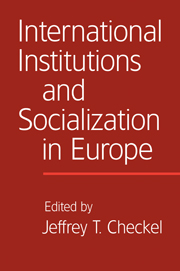Book contents
- Frontmatter
- Contents
- Preface
- Contributors
- Part I International Institutions as Community Builders
- Part II The Socializing Power of European Institutions
- 2 Strategic Calculation and International Socialization: Membership Incentives, Party Constellations, and Sustained Compliance in Central and Eastern Europe
- 3 Several Roads Lead to International Norms, but Few Via International Socialization: A Case Study of the European Commission
- 4 Multiple Embeddedness and Socialization in Europe: The Case of Council Officials
- 5 The Janus Face of Brussels: Socialization and Everyday Decision Making in the European Union
- 6 Security Institutions as Agents of Socialization? NATO and the ‘New Europe’
- Part III Critique, Conclusions, and Extensions
- Index
- References
2 - Strategic Calculation and International Socialization: Membership Incentives, Party Constellations, and Sustained Compliance in Central and Eastern Europe
Published online by Cambridge University Press: 06 November 2009
- Frontmatter
- Contents
- Preface
- Contributors
- Part I International Institutions as Community Builders
- Part II The Socializing Power of European Institutions
- 2 Strategic Calculation and International Socialization: Membership Incentives, Party Constellations, and Sustained Compliance in Central and Eastern Europe
- 3 Several Roads Lead to International Norms, but Few Via International Socialization: A Case Study of the European Commission
- 4 Multiple Embeddedness and Socialization in Europe: The Case of Council Officials
- 5 The Janus Face of Brussels: Socialization and Everyday Decision Making in the European Union
- 6 Security Institutions as Agents of Socialization? NATO and the ‘New Europe’
- Part III Critique, Conclusions, and Extensions
- Index
- References
Summary
After the end of the Cold War, European regional organizations proclaimed liberal democracy as the new standard of legitimacy for the states of the emerging pan-European international community. These organizations defined the international socialization of the ex-communist Central and East European countries (CEECs) to this standard as a new core task for themselves, and devised a diversified set of instruments—reaching from the provision of expertise to membership conditionally—to promote and support the democratic consolidation of the region.
Fifteen years later, it is obvious that the results have been highly divergent. Whereas one group of countries, mainly the central European and Baltic countries, quickly and smoothly adopted fundamental liberal norms of state organization and conduct, other CEECs—most notably Belarus and Serbia—have long defied “Westernization.” Still others have displayed inconsistent patterns characterized by stop-and-go processes or fluctuation between progress and reversals. The aim of this article is to explore the causal mechanism and conditions that have produced the uneven outcomes and pathways of democratic international socialization in the CEECs.
My argument is based on a rationalist approach to international socialization. It conceives of socialization as a process of reinforcement that has three major components. First, whereas European regional organizations have used a variety of strategies and instruments, only the high material and political rewards of membership in the European Union (EU) and the North Atlantic Treaty Organization (NATO) have triggered sustained domestic change in those CEECs that initially violated the liberal-democratic community norms.
- Type
- Chapter
- Information
- International Institutions and Socialization in Europe , pp. 31 - 62Publisher: Cambridge University PressPrint publication year: 2007
References
- 4
- Cited by

